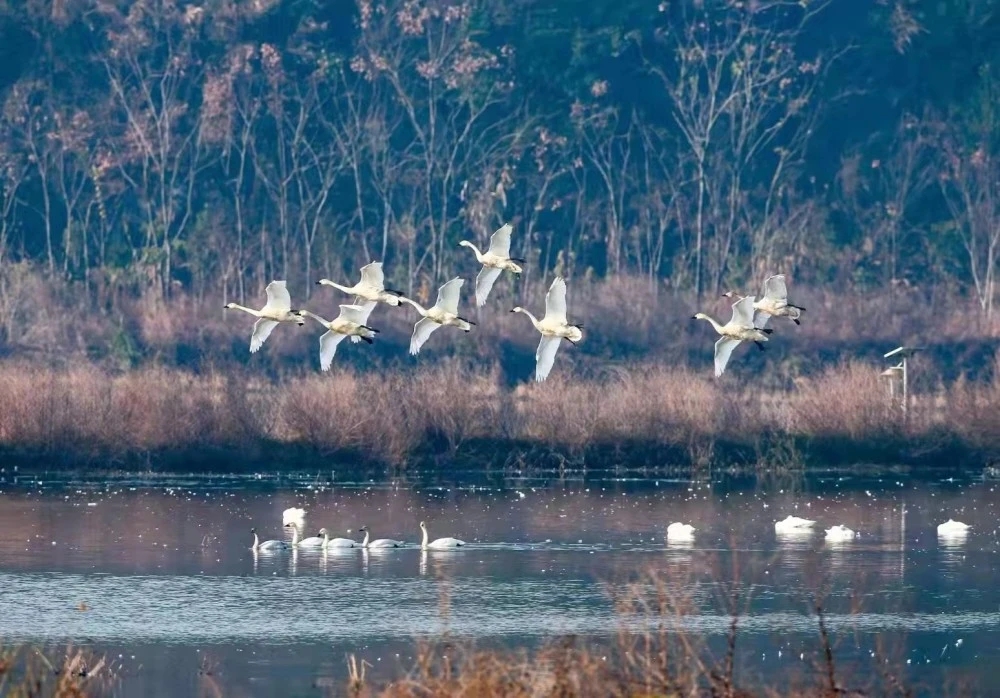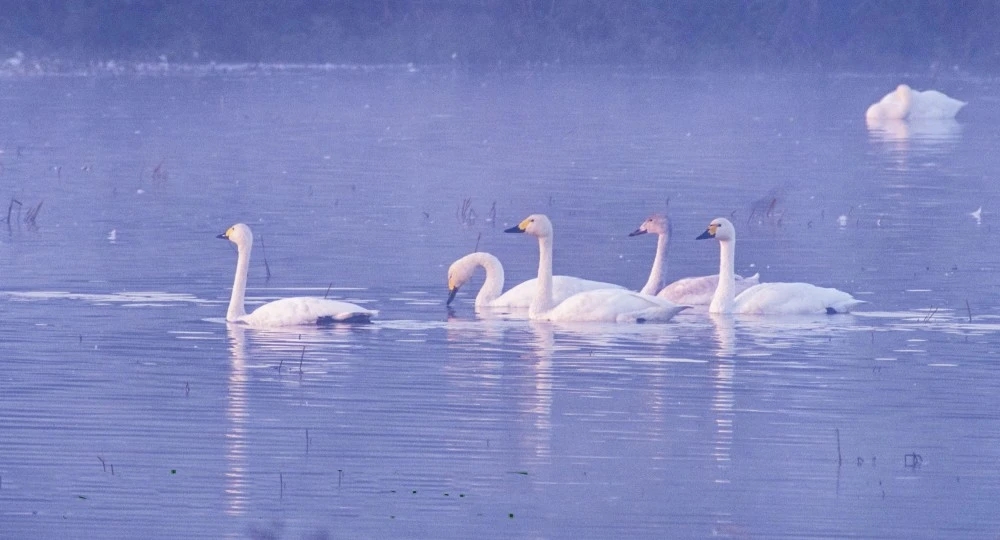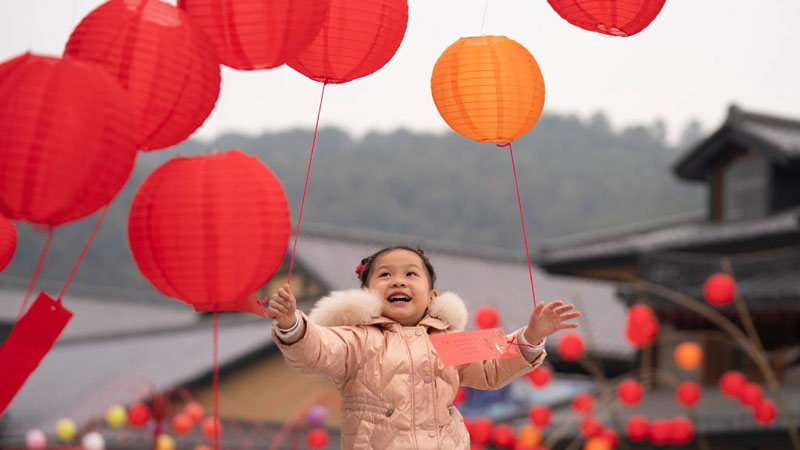Eco-friendly farm in central China's Hubei becomes paradise for wild swans

Wild swans are seen in a rice field of a family farm in Wuxue city, central China's Hubei Province. (Photo/Changjiang Daily)
By developing an eco-friendly farming system, a family farm in central China's Hubei Province has provided an attractive habitat for migratory birds and promoted the integrated development of agriculture and tourism.
Zhong Xixiu, the owner of the family farm, which is located in Wuxue city, Hubei, said that wild swans have been spotted in her ecological rice fields during the winter seasons for 12 consecutive years.
Her rice fields’ sound ecological environment and abundant food have turned the place into a winter habitat for the birds, Zhong explained, adding that an ecosystem consisting of fish, earthworms, crayfish and water weeds has been developed here.
Several years ago, the farm was a low-lying field full of hardened soil.
In 2009, Zhong realized that Chinese people had started to pay more attention to eating good quality food, and that natural and healthy food would enjoy brighter prospects, after hearing in the news that the Chinese government had passed the Food Safety Law that year.
Zhong, together with her husband, signed contracts with local farmers for the right to use more than 300 mu of land (about 20 hectares) through a rural land transfer. The land had been planted with cotton and rice rotatively, and due to the use of chemical fertilizers and pesticides, the soil had become severely hardened. In addition, the water areas were randomly scattered around different rice fields.
To improve the quality of the farmland and make it fertile, Zhong and her husband used excavators to change the layout of the fields. To improve the soil, they first applied biological fertilizers to it and then raised fish in the rice fields. Thanks to these efforts, chemical fertilizers and pesticides started to be used less.
In 2010, Zhong began raising crayfish in the rice fields, but due to a lack of experience, the business failed in its first year.

Photo shows Zhong Xixiu and her husband in a rice field in Wuxue city, central China's Hubei Province. (Photo/Changjiang Daily)
However, Zhong found that the quality of the soil had improved significantly after she saw a tiger frog in the rice field. She was later told by Chen Rongjian, an agricultural technician, that the tiger frog is under state protection in China, and its appearance indicated that the ecological environment of Zhong's farm had improved.
In 2013, Zhong was able to run a profitable crayfish farming business. In June of the same year, Zhong and her husband found that the yellow soil had turned partially black. Chen told her that after resting for nearly five years, the farmland had become more fertile as the humus content in the soil had continued to increase.
Thanks to this, the quality of rice planted in the fields became much better.
Zhong also explored a farming model by cultivating crayfish and rice together in the rice fields and lotus and crayfish together in the lotus ponds, while expanding the growing areas to more than 2,000 mu through rural land transfers. This way, she was able to harvest more than 1,500 kg of crayfish on an average day in summer.
In the winter of 2011, Zhong saw eight large birds swimming in the water in her rice fields, and in October the next year, she saw hundreds of what she believed were ducks. When she took pictures of these "ducks" and showed them to people around her, she learned that they were actually wild swans, a species under second-class state protection in China. Zhong and her husband started to feed the swans while avoiding disturbing them.
During the following autumn harvest seasons, Zhong would specially save food and water for the swans.
In addition to wild swans, other migratory birds started to appear in Zhong's farm during winter thanks to its sound ecological environment. To feed the birds, Zhong planted water weeds in the fields and used 50,000 kg of rice to feed them every year.
Zhong had been worried about the fact that the swans would eat the crayfish she raised, while her husband didn't understand why they had to provide food for the swans, which did not generate any profits for them. However, the couple later found that the crayfish that survived the swan attacks were bigger and of higher quality.
"Other people's crayfish fry sold for a maximum of 30 yuan ($4.45) per kg, and mine sold for more than 40 yuan per kg. Buyers had to wait to receive the fry after placing an order," said Zhong.

Wild swans are seen in a rice field of a family farm in Wuxue city, central China's Hubei Province. (Photo/Changjiang Daily)
Zhong's farm became known for its development of eco-friendly agriculture. After visiting her farm, the Hubei Province Grain and Oils Group Co., Ltd. decided to work with Zhong, and registered a trademark together. The collaboration brought the price of Zhong's rice to 30 yuan per kg, five times the average price.
Zhong has promoted this eco-friendly farming mode by letting local villagers copy her farming methods, helping them increase their own incomes. She has also established a cooperative and invited local villagers to become members.
To promote standardized farming, Zhong taught farming techniques to the farmers and worked together with the Institute of Subtropical Agriculture, Chinese Academy of Sciences, which is based in central China's Hunan Province, to optimize the eco-friendly farming mode.
Zhong's farm has become a haven for bird lovers and photographers to watch and take pictures of the migratory birds. During the high season for bird watching, the farm receives more than 1,000 people a day.
In 2022, Zhong's farm was approved to become a science education base. Recently, a tourism company has contacted Zhong to plan the development of a homestay business and agritainment in the locality. Under Zhong and her husband’s influence, the locals’ awareness of swan protection has been raised.
In the winter of 2021, more than 10,000 wild swans came to Zhong's farm to spend the winter. This was much more than the couple expected, and they hadn't prepared enough food to feed so many of them. Charity personnel learned about this and launched a fundraising activity online to collect money to buy food for the swans.
In 2022, Zhong's farm was rated as a national eco-friendly farm. By the end of 2022, there were 27 national eco-friendly farms in Hubei Province.
Photos
Related Stories
Copyright © 2023 People's Daily Online. All Rights Reserved.









